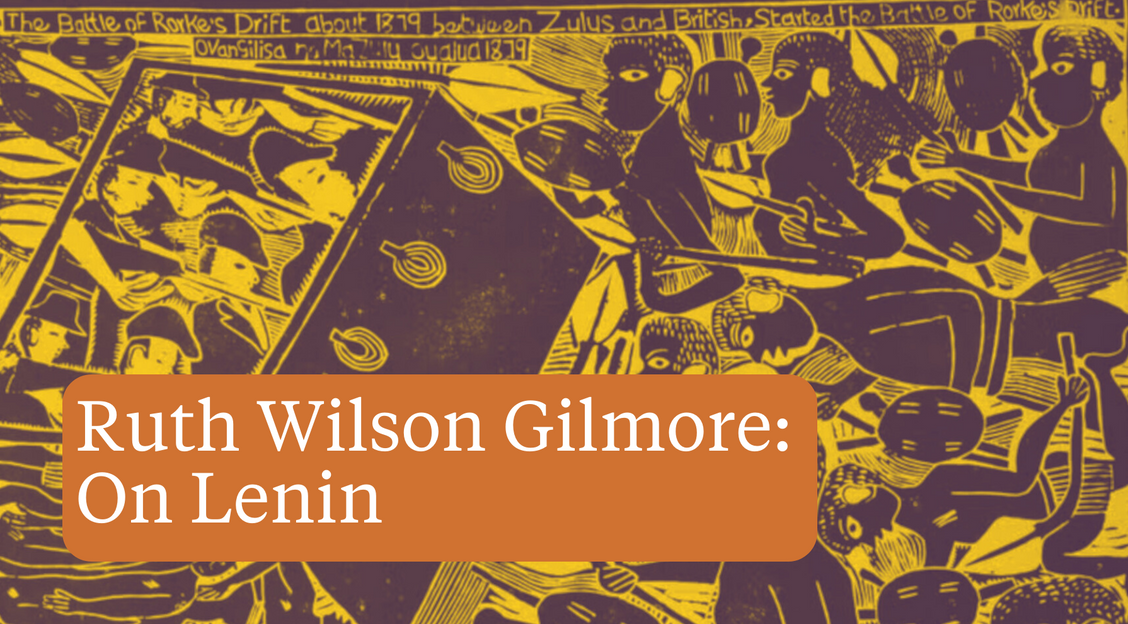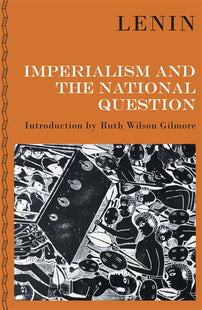Ruth Wilson Gilmore: On the Centenary of Lenin's Death
Ruth Wilson Gilmore asks how might the politics explained or implied in Lenin’s writings inform our analytical and practical grasp of what is to be done now, in her introduction to Imperialism and the National Question.

Lenin was present in my early consciousness of politics and communism: the Soviets and ‘us’. In this instance, ‘us’ was some combination of Negro peoples – soon to become Black in the US – who were involved in the post–WWII round of emancipation. Universalist and internationalist in ambition, this movement linked up and shared inspiration and analysis with global anti-imperial liberation movements. The weapon of theory, as we understood it, was meant to both guide and to respond to action. We had to repeatedly assess our own resources. Was anything consistently reliable? We were constantly debating and acting on our insights about how to fight, which included making decisions about what we were fighting. In other words, the struggles, and the people who fought them, developed constantly – driven by the ongoing effort to know the dynamic objects of our antagonism. We wanted to win.
In order to evade being absorbed – formally emancipated – into a social reality that would perpetuate the domination that generations had organised to undo, we had to not only ‘resist’ culturally and politically but also build our awareness of organised violence as an ensemble of activities impeding abolition in general. This ensemble of activities turns every ‘what’ into a ‘where’ because violence is always a spatial practice that produces and defines territories, peoples, mobility, possibility.
If capitalism reached its highest stage at the beginning of the twentieth century, it surely hasn’t run out of energy. Capitalism saving capitalism from capitalism is a way to think about the mode of production’s necessary dynamic through which it realises its inherent imperative. Whatever problem production or accumulation runs up against, innovation appears to resolve. Technological and financial barriers to entry enable capitals that innovate with particular time-space felicity to dominate and eventually monopolise. What Lenin noticed in thinking about finance, monopoly, and imperialism is akin to what many kinds of intellectuals throughout modernity keep noticing too: tools for innovation comprise technologies of many kinds – productive but also political, military, murderous. There is no singular rationality of power, as Herman Bennett reminds us.
When asked if I’d like to write something to recognise the centenary of Lenin’s death, I thought it would be a great opportunity to share what thinking with Lenin might help us see as we make our way in this unrolling present. Why should we read this collection of Lenin’s writing today? What do these writings show us about theory breaking into practice, and how might the politics explained or implied in these writings inform our analytical and practical grasp of what is to be done now? How are the two key concepts – imperialism and self-determination – explored here by Lenin relevant? The organised violence of imperialism continues to stalk the earth in the form of its fleshly and ghostly remnants – accumulated underdevelopment – and viscerally in contemporary unequal relations of power that rush value upward, by way of elites, to the ‘economic north’, wherever the owners might reside. But in its muscular liveliness, self-determination hasn’t disappeared from the earth’s surface, nor wholly been absorbed into the system of nation-states mostly disciplined by debt and developmentalism.
We should read as though we are thinking with Lenin in his time while also thinking about the struggle at hand, so that Marxism’s contemporary practicality doesn’t get lost. This practicality cannot be overstated, even if the frenzy of many debates obscures underlying necessity. As an organiser active during the 1930s in New York City explained, ‘We went out every night after supper to knock on strangers’ doors. I’d say “I am from the Communist Party and I am here to help you solve your problems.”’
In contrast to such theoretically guided practicality, a good deal of mainstream Western Marxism seems culturally shaped by a quest for truth revealed on the page. That might be because so many of its adherents are themselves born-again historical materialists. Their fundamentalism is barely Methodist (though method plays a big role in the confusion), but rather more Calvinist. The sober assessment of how the world works casts a shadow dividing the elect from the rest in austere dismissal of politically meaningful conditions of existence and analytically powerful categories of analysis. More than communism, it would seem, the specter of Weber haunts the West.
There was always something about Lenin, to my youthfully vigorous mind, that was other than the West. This was due in part to reassuring if woeful presumptions about physique – eyelids, cheekbones, and other aftermaths of the racist ‘science’ of humanity that raged as Ulyanov came of age. But something else, too – less easy to confess but viscerally there – a peculiarly not-liberal universalism that offered theoretical muscle for the struggle at hand as something we all could and should exercise.
One night in the late 1960s, during the point-counterpoint of assassinations and riots, I wandered through town looking for my father in hope of a ride home. He’d been invited to speak at a teach-in, one of those noisy aftermaths to the din of police and fire and sirens and bullets and protest, in which people try to craft sentences out of crisis and churn. He had street cred. Whatever he said, though most certainly in the style of harangue, would have tightly followed the locally fatal contours of power and difference. He would have insisted on how they at once originated from and radiated in dynamic connection to liberation struggle in general. Skipping that talk, I found my father’s car with the event flyer stuck under the windshield wiper – his name circled, annotated: ‘Looks like Lenin.’
— An edited excerpt from Imperialism and the National Question by V. I. Lenin, Introduction by Ruth Wilson Gilmore.
[book-strip index="1" style="buy"]

